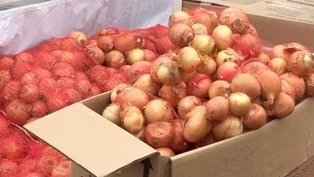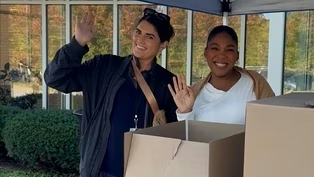
Report Says Gen-Z Parents Least Likely to Read to Their Kids
Clip: Season 4 Episode 89 | 4m 39sVideo has Closed Captions
The report is from the book publisher HarperCollins.
The number of parents reading to their children is at an all-time low. The study by book publisher HarperCollins also found that the parents least likely to read to their children are Gen-Z. Bill Goodman, executive director of Kentucky Humanities, talks about what the study means for literacy efforts.
Problems playing video? | Closed Captioning Feedback
Problems playing video? | Closed Captioning Feedback
Kentucky Edition is a local public television program presented by KET

Report Says Gen-Z Parents Least Likely to Read to Their Kids
Clip: Season 4 Episode 89 | 4m 39sVideo has Closed Captions
The number of parents reading to their children is at an all-time low. The study by book publisher HarperCollins also found that the parents least likely to read to their children are Gen-Z. Bill Goodman, executive director of Kentucky Humanities, talks about what the study means for literacy efforts.
Problems playing video? | Closed Captioning Feedback
How to Watch Kentucky Edition
Kentucky Edition is available to stream on pbs.org and the free PBS App, available on iPhone, Apple TV, Android TV, Android smartphones, Amazon Fire TV, Amazon Fire Tablet, Roku, Samsung Smart TV, and Vizio.
Providing Support for PBS.org
Learn Moreabout PBS online sponsorshipThe number of parents reading to their children is at an all time low.
That's according to a new study by book publisher Harpercollins.
Found that 41% of kids four years old and younger are being read too frequently.
In 2012, that number was 64%.
The parents less likely to read to their children.
Gen Z Bill Goodman, executive director of Kentucky Humanities, recently wrote an op ed piece on the study, and he spoke with us about it and what it means for literacy efforts.
Our first question to him, why are so few Gen Z parents interested in reading to their children?
One I think at times it's challenging for the parent to get fully involved in a child's book.
If they don't have any interest in it at all, it might be boring to them.
They might think they are trying to force a habit on their child.
They're not interested in in pursuing that.
But two, I think that without question, and it doesn't take a rocket scientist to figure this out.
We're all so devoted to our devices these days.
Everyone has a phone.
An enormous number of children.
Teenagers, young people, Gen Zers, all the way up, to people my age are relying on their phones more than they ever have before.
There's an incredible number of phones out there, especially phones, tablets, ways to, interact with technology games.
And along with that comes the, the fact that, Gen Zers and others too, aren't reading as often and as much as they used to.
So it's a it's a real challenge.
But what I think we at Kentucky Humanities are trying to do, along with a number of other literacy organizations, is bring people back to the book, bring people back to a time when a parent can have some quiet time with a child, whether it's after dinner or before bedtime.
Find something that, is of interest to the adult and the child.
It might take a little bit of work.
They can probably, Google, an interest that they have and find something that's been written about it that they want to share with their child.
So, it's, it's a challenging time for publishers, and for people who want to bring people back into libraries, back into, literacy organizations.
And it's not going to happen overnight because, again, we are so locked in and married to our devices in the state of Kentucky.
And just the the latest study reading scores, for fourth graders, eighth graders are up slightly.
But at one time, not too long ago, we were at 36th in the nation.
And I don't think anybody wants to be satisfied with with being 36.
When you read to a child, you're helping that child with critical thinking, with problem solving.
You're discussing those things.
You're you're looking at the character in the book and how that character maneuvers through society and civilization.
They are learning socialization.
They're learning how to to be a friend to somebody, to relate to an adult.
There are a number of factors that, if we're not reading to our children, if the children aren't reading a book, then we're losing a great deal.
And that's going to be very difficult, to get back as they grow older.
They need that now as a base.
There's a, a move afoot, as you know, in the state of Kentucky for preschool or pre-K.
Getting those kids involved before they go into kindergarten or the first grade.
It's very important that we we reintroduce these parents that we're talking about.
And I don't want to, to pick on the Gen Zs.
They are they just need to be brought back into the fold, and and, and given a the information that if they read to their child, before bed each night or at a, at a particular time during the day, on the weekends, get a habit started, a good habit, not a bad habit, but a good habit.
I think we'll see those test scores improve even more tomorrow night on Kentucky Edition.
More of our conversation with our good friend Bill Goodman, who shares how programs like the Kentucky Book Festival, presented by the Kentucky Humanities, helps encourage literacy and reading and children.
Calls for Special Session to Address SNAP in Kentucky
Video has Closed Captions
Clip: S4 Ep89 | 1m 36s | Gov. Beshear was asked about the possibility of a special session on Thursday. (1m 36s)
Kentucky Farmers Cautiously Optimistic After New Trade Deal
Video has Closed Captions
Clip: S4 Ep89 | 2m 2s | The deal will allow U.S. soybean exports to China to resume. (2m 2s)
Louisville Recovery Program Launches Food Pantry
Video has Closed Captions
Clip: S4 Ep89 | 7m 11s | It's in partnership with Dare to Care to help distribute food to those in need. (7m 11s)
Providing Support for PBS.org
Learn Moreabout PBS online sponsorship
- News and Public Affairs

Top journalists deliver compelling original analysis of the hour's headlines.

- News and Public Affairs

FRONTLINE is investigative journalism that questions, explains and changes our world.












Support for PBS provided by:
Kentucky Edition is a local public television program presented by KET


